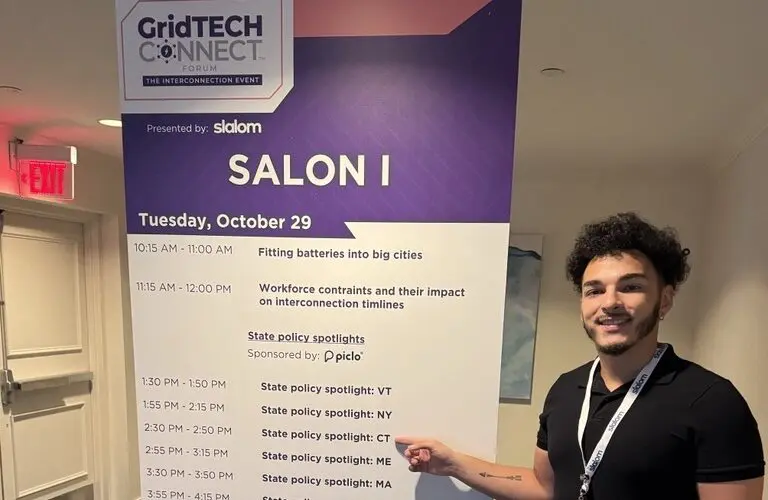GridTECH Connect Forum Northeast 2024: Connecticut State Policy Spotlight
Acadia Center was invited to participate and present at GridTECH Connect Forum Northeast in Newport, Rhode Island, on October 28 – 30. GridTECH Connect Forum is a conference focused on distributed energy resources and utility-scale interconnection, renewable energy development, clean energy policy, utility regulation, and more. The conference facilitated conversations on innovative solutions, forward-thinking policy, and clean energy programs that are helping the Northeast reach ambitious clean energy goals. Speakers and workshops during the event highlighted key challenges and obstacles on the path to phasing out fossil fuels and transforming and modernizing the grid while providing a unique opportunity to advance the critical issue of grid interconnection.
In the Northeast, obstacles remain in place on the path to meeting clean energy targets. The region must continue to work collaboratively on grid modernization and distributed energy resources, policy and regulatory processes, and bold solutions that align with an equitable clean energy economy.

Acadia Center’s Climate and Energy Justice Policy Associate, Jayson Velazquez, presented a state policy spotlight on Connecticut to a diverse array of stakeholders ranging from electric utilities and grid operators to project developers, policymakers and policy advocates from the region. Jayson shared policy progress over recent years, including present and future opportunities in Connecticut’s clean energy transition.
Here are some key takeaways from the conference and key points from the Connecticut state policy spotlight:
Energy Affordability and Equity: Connecticut residents face some of the highest costs for electricity in the country and over 400,000 households in Connecticut face unaffordable energy costs. Energy burden for households with an income 0-60% of the state median income experience an energy burden well above 6%. If the energy burden of these households were reduced to 6%, residents would be saving hundreds of millions of dollars on energy. Recent rate increases, which can be better understood here, have brought high energy costs, the Public Benefits Charge, and the affordability of the state’s clean energy transition to the forefront of media.
Energy Efficiency: The Connecticut Energy Efficiency Board approved the 2025 – 2027 Conservation and Load Management plan which has a total budget of $706M. This is a slight decrease in the available budget despite rising operation costs and increased residential and income-eligible program demand. There are opportunities with incoming federal funding to provide pathways for energy efficiency and electrification. However, it is critical to continue balancing traditional energy efficiency measures with electrification, and electrification with weatherization.
Utility Innovation and Accountability: Connecticut and the Public Utilities Regulatory Authority (PURA), under the leadership of Chair Marissa Gillett, have become innovative leaders in recent years on utility regulation. Many of the recent advances can be attributed to the 2019 Equitable Modern Grid Framework, which comprised almost a dozen proceedings focused on updating grid infrastructure, planning processes, communications, and data management systems to improve grid readiness for advanced energy technologies. The Equitable Modern Grid Framework also included battery storage incentive programs, plans for advanced metering infrastructure and smart meter deployment, updated low-income discount rates, and the Innovative Energy Solutions program to support pilot projects from both utilities and third parties. Recently, the focus has been largely on the Performance-Based Regulation (PBR) proceeding, which was initiated by the Take Back Our Grid Act in 2020. More on Connecticut’s PBR proceeding, which is now moving into the Integrated Distribution System Planning framework, can be found here. Other notable advancements from PURA include upstanding a Stakeholder Compensation Program that provides funding opportunities for organizations who might have had barriers to participating in PURA proceedings. Senate Bill 7 from 2023, prohibited the recovery through customer rates advertising, lobbying, charitable, investor-related, and trade association expenses used to influence public opinion.
Offshore Wind: In 2019, Connecticut authorized the procurement of up to 2,000 MW of offshore wind energy by 2030, equivalent to 30% of the state load and the largest authorization of any state in the region at the time. The Connecticut Department of Energy and Environmental Protection (DEEP) estimated an additional 3,745 to 5,710 MW of offshore wind would be needed to meet the state’s 2040 zero carbon goals. In 2023, Connecticut saw the termination of the Power Purchase Agreement from Avangrid for the Park City Wind Project. In 2024, intended multi-state offshore wind procurement efforts between Connecticut, Massachusetts, and Rhode Island have not yet produced the intended outcomes. There have been no new offshore wind commitments from Connecticut despite ongoing discussions across the region.
Federal Funding Awards: Connecticut, in collaboration with states in the region and on its own, has been awarded a substantial amount of federal funding for clean energy projects. In a joint effort, Connecticut and states in the Northeast received a combined $450M Department of Energy award to fund a multi-state heat pump deployment effort. Connecticut and Northeast states were also awarded a $389M Department of Energy award through the Grid Innovation Program (GRIP) to fund regional electric infrastructure through Power Up New England. On transportation, Connecticut and other states were awarded $250M to fund medium- and heavy-duty electric charging stations along a multi-state I-95 corridor. Under the leadership of DEEP, the Lamont Administration, and key clean energy stakeholders, Connecticut has also been awarded $62.45M to upstand Solar for All, and an additional $100M split across Home Energy Rebates and Home Electrification and Appliance Rebate Programs.
Looking Ahead and Upcoming Priorities: As the 2025 legislative session approaches, key priorities to further Connecticut’s clean energy transition include increased energy efficiency funding, pursuing a future of gas and affordable head proceeding, grid enhancing technologies, advanced transmission technologies, and non-pipeline alternatives.
Acadia Center would like to thank GridTECH Connect Forum Northeast for the opportunity to share policy knowledge and expertise with conference attendees. A special thank you to Katie Kuzma and the conference planning team for support and assistance with logistics.
To view the full presentation, click here.



















